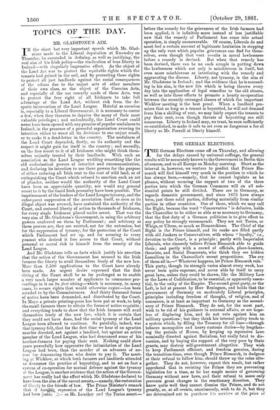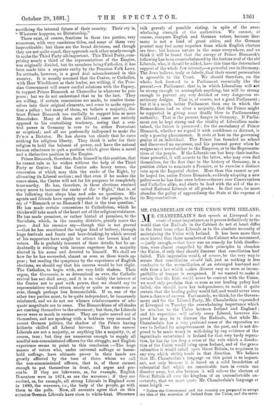THE GERMAN ELECTIONS.
THE German Elections came off on Thursday, and allowing for the delays caused by universal suffrage, the general results will be accurately known to the Government in Berlin this afternoon, and to all Europe on Monday morning. Short as the interval is, however, we venture to predict that Prince Bis- marck will find himself very much in the position in which he has always been,—namely, that he cannot legislate as he pleases, without securing the support of two of the three parties into which the German Commons will on all sub- stantial points be still divided. There are in Germany, as regards domestic government, and since 1875 have always been, just three solid parties, differing materially from similar- parties in other countries. One of these, which we may call the Right, because the word " Conservative " is delusive, holds the Chancellor to be either so able or so necessary to Germany,. that the first duty of a German politician is to give effect to. any policy he strongly recommends. They are not Tories, or Whigs, or Ultras, so much as Bismarckians. The Chief of the Right is the Prince himself, and its ranks are filled partly with old Junkers or Conservatives, with whom "loyalty," i.e., devotion to the Court, is a principle; partly with Imperialist Liberals, who sincerely believe Prince Bismarck able to guide- them' ; and partly with a crowd of officials, place-hunters, theorists, and Social Democrats, who think they see hidden La.ssallism in the Chancellor's recent propositions. The cry of them all is,—" Whatever happens, let Prince Bismarck rule."' This party, though its strength varies almost every week, has never been quite supreme, and never able by itself to carry- great laws, unless they could be shown, like the Military Law or the Laws of Codification, to be essential, or apparently essen- tial, to the unity of the Empire. The second great party, or the Left, is led at present by Herr Beningsen, and holds that the government of Germany on moderately Liberal principles,. principles including freedom of thought, of religion, and of commerce, is at least as important to Germany as the ascend.- ancy of Prince Bismarck. They do not, for the most part,. wish to be rid of his guidance in external affairs, or are hope- less of displacing him, and do not vote against him on, military questions ; but they think his internal policy tends to. a system which, by filling the Treasury for all time—through. tobacco monopolies and heavy customs duties—by lengthen- ing the periods of Recess, by keeping up repressive laws nominally directed against Socialism, but really fatal to dis- cussion, and by buying the support of the very poor by State grants, may destroy self-government altogether. They wish to keep Parliament efficient, and freedom genuine, during the transition-time, even though Prince Bismarck, in dudgeon at their refusal to follow him, should throw up the reins alto- gether. They do not, however, expect this result, but rather apprehend that in resisting the Prince they are preventing legislation for a time, as he has ample means of governing- Germany without new laws, and their refusal to move only prevents great changes in the reactionary direction. They know quite well they cannot dismiss the Prince, and do not greatly, or, at all events, unanimously, wish to do it, but they are determined not to purchase his services at the price of
sacrificing the internal future of their country. Their cry is, "Whatever happens, no Dictatorship." There exist, of course, fractions in these two parties, very numerous, with very cumbrous titles, and some of them very impracticable; but these are the broad divisions, and though they are not quite equal, they approach each other nearly enough to make the Third Party all-important. This Third Party, com- prising nearly a third of the representatives of the Empire, was originally divided, but its members being Catholics, it has been made into a separate entity by the Prussian Falk Laws. Its attitude, however, is a good deal misunderstood in this country. It is usually assumed that the Centre, or Catholics, with Herr Windthorst as their leader, are willing, if the Prus- sian Government will renew cordial relations with the Papacy, to support Prince Bismarck as Chancellor in whatever he pro- poses ; but we do not understand that to be the fact. They are willing, if certain concessions are made, to resolve them- selves into their original elements, and cease to make opposi- tion a policy ; but many of them, we believe a majority, dis- trust Prince Bismarck too cordially to support him as mere Mamelukes. Many of them are Liberal ; some are entirely opposed to his centralising tendency, seeing that a cen- tral power in Germany is sure to be either Protestant or sceptical ; and all are profoundly indisposed to make the Pine a Dictator. He has shown too clearly that he cares nothing for religious liberty. They think it safer for their religion to hold the balance of power, and have the natural human reluctance to quit a position which gives them a novel and a distinctive position in the Empire.
Prince Bismarck, therefore, finds himself in this position, that he cannot rule as he wishes without the help of the Third Party or Centre ; that the Centre asks heavy terms, the concession of which may thin the ranks of the Right, by alienating its Liberal section ; and that even if he makes the concessions, the Centre will not for his purposes be completely trustworthy. He has, therefore, in these elections strained every nerve to increase the ranks of the "Right," that is, of the following that obeys him and asks no questions. His agents and friends have openly appealed to the people, to the cry of "Bismarck or no Bismarck? that is the true question." He has made certain concessions to Catholicism, which he thinks will take much of the heart out of the religious resistance. He has made promises, or rather hinted at promises, to the Socialists, which, in the country districts, greatly move the poor. And his enemies say—though this is not proved —that he has sanctioned the vulgar kind of bribery, through huge festivals and feasts and beer-drinking, by which several of his supporters have sought to attract the lowest kind of voters. He is probably innocent of those details, but he un- doubtedly is striving with intense eagerness for a majority elected in his name and devoted to himself. We shall see how far he has succeeded, almost as soon as these words ap- pear; but reading the symptoms by the experience of English elections, we should say that his success would be hut slight. The Catholics, to begin with, are very little shaken. Their organ, the Germania, is as determined as ever, the Catholic revival has not died away, and it is so visibly the interest of the Centre not to part with power, that we should say its representatives would return nearly or quite as numerous as ever, though perhaps less Irreconcilable. If so, one of the other two parties must, to be quite independent, be immensely reinforced, and we do not see whence reinforcements of ade- quate magnitude are to come. The Bismarckians of all shades are exerting themselves to the uttermost; but then,the Liberals never were so much in earnest. They are quite moved out of themselves, and are speaking with a boldness very unusual in recent German politics, the shadow of the Prince having
hitherto chilled all Liberal fervour. That the earnest Liberals are not a majority, or anything like a majority, is, of course, true ; but they are numerous enough to supply all needful non-commissioned officers for the struggle, and English experience seems to point to this conclusion :—The huge masses of voters who, under universal suffrage or house- hold suffrage, have ultimate power in their hands are greatly affected by the tone of those whom we call the non-commissioned officers, that is, of those earnest enough to put themselves in front, and argue and per- suade. If they are lukewarm, as, for example, English Dissenters were in 1874, so are the waverers ; if they are excited, as, for example, all strong Liberals in England were
in 1880, the waverers, i.e., the body of the people, go with them to the polls. Now, all accounts agree that on this occasion German Liberals have risen to white-heat. Observers
talk gravely of possible rioting, in spite of the over- whelming strength of the authorities. We cannot, of course, compare English and German voters, because Ger- many is not a land of great cities, and the German peasant may feel many impulses from which English electors are free ; but human nature is the same everywhere, and we think it will be found that the energy of Prince Bismarck's following has been counterbalanced by the furious zeal of the old Liberals, who, it should be added, have this time the determined support of the whole Jew interest,—a powerful one in Germany. The Jews believe, truly or falsely, that their recent persecution is agreeable to the Court. We should therefore, on the whole, look forward to a Parliament essentially like the present,—a Parliament, that is, in which Liberalism will mot be strong enough to accomplish anything, but will be strong enough to prevent any very decided or very dangerous re- actionary designs. That is, of course, not a good Parliament ; but it is a much better Parliament than one in which the Bismarckians had so clear a majority, that the Prince might be supported in giving some deadly blow to Parliamentary authority. That is the present danger in Germany. If Parlia- ment can be kept strong and the vitality of Liberalism main- tained, the future is preserved ; for the ascendancy of Prince Bismarck, whether we regard it with confidence or distrust, is only a passing phenomenon. It rests at best on the governing genius of an individual. The Prince has founded no school and discovered no successor, and his personal power when he resigns must revert either to the Emperor, or to the Representa- tives of the people. If the Liberals can but keep their institu- tions powerful, it will accrete to the latter, who may even find themselves, for the first time in the history of Germany, in a position either to nominate a Premier, or to exercise a distinct veto upon the Imperial choice. More than this cannot as yet be hoped for, unless Prince Bismarck, suddenly adopting a new policy—as he has done once before—throws over Conservatives and Catholics alike, and elects to lead with the aid of the re- united National Liberals of all grades. In that case, he must abandon the policy of aggrandising the State at the expense of its Representatives.



































 Previous page
Previous page